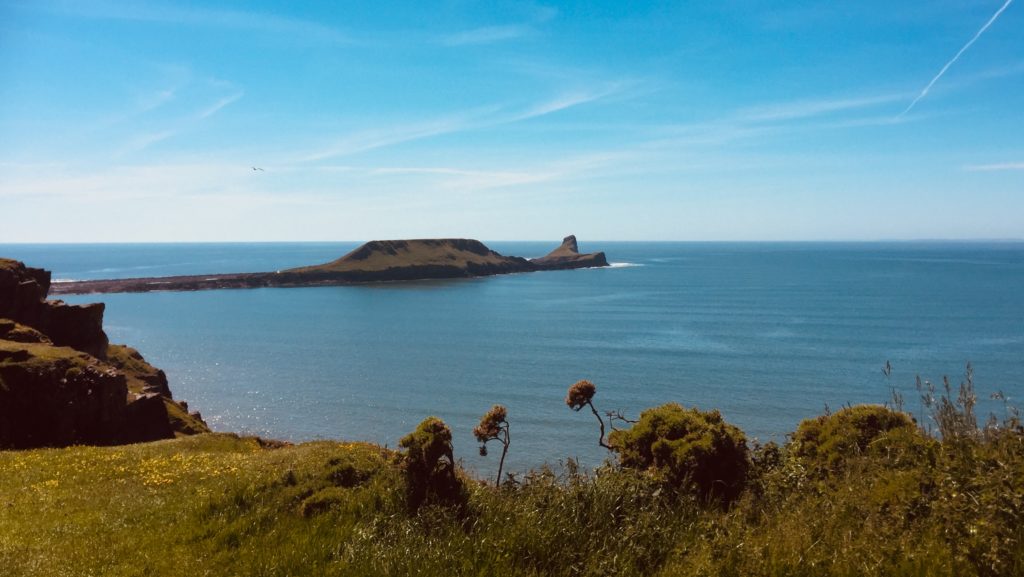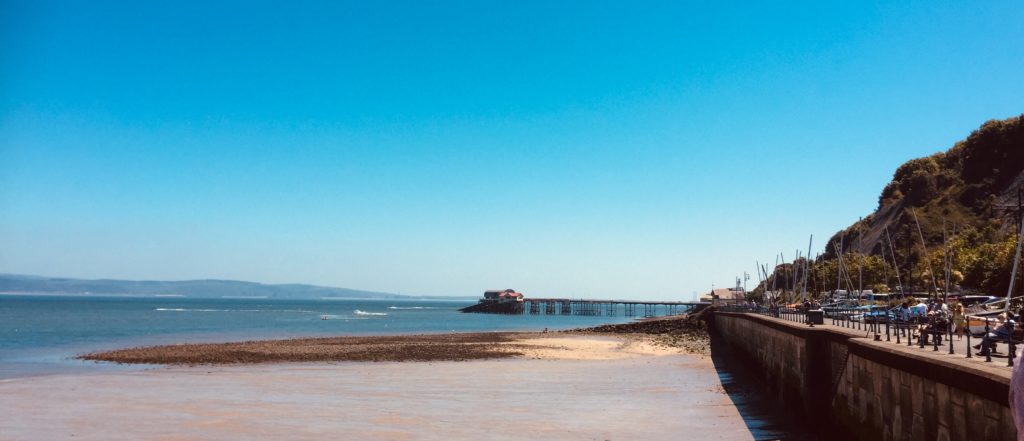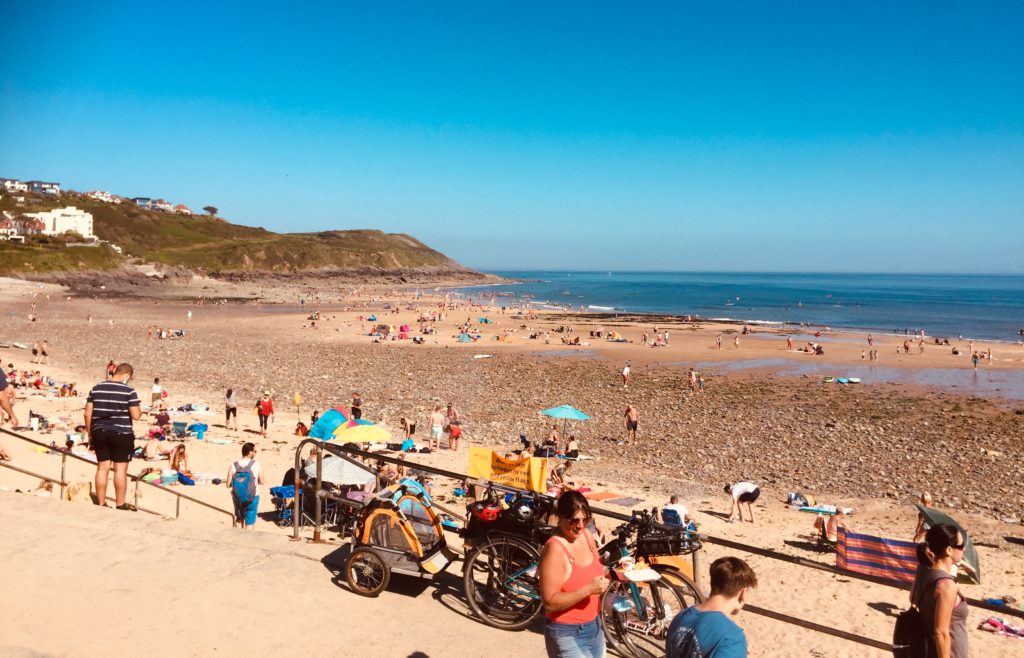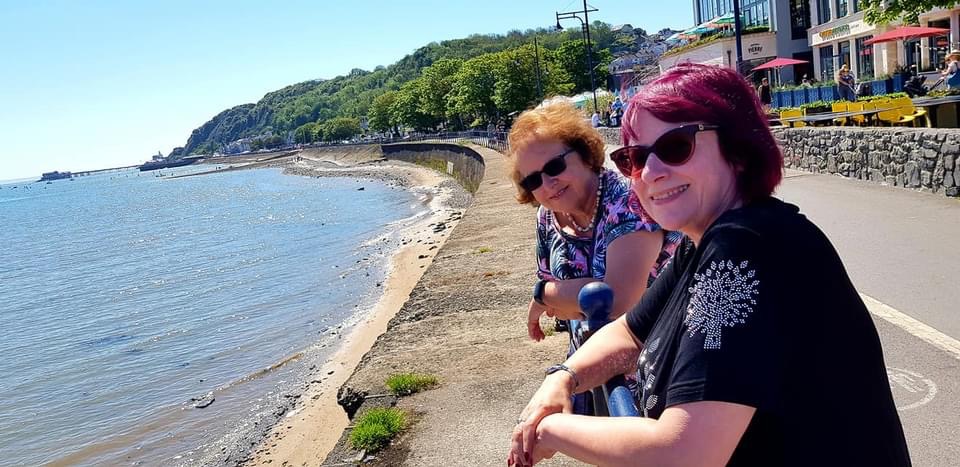I’m sitting on a rough wooden bench looking out at the Worm’s Head, one of the most famous landmarks on the Gower Peninsula. It is looking particularly stunning today, resting underneath a blue sky striped with faint clouds and aircraft trails.
It is a distinctive promontory that Queen of Dragons Daenerys Targaryen might have used to demonstrate her power. (I later discovered that the name is derived from the Old English word for dragon, so ‘worm’ is just a poor translation.)
It is crowded in Rhossili today, which is unusual for this time of year. The village is no longer Gower’s best-kept secret – no longer the windswept place mostly inhabited by sheep and locals.
I am looking for peace and quiet, but there is a steady stream of people walking down towards the head and looking out across the near-deserted, unspoilt three-mile beach. I want to contemplate the beauty, the stillness, the never-changing landscape alone, but on this occasion I’ll have to share it.
It’s all about family
I’ve been coming to the Gower since I was a child. My mum was born in Mumbles, near Swansea, and met my dad here. His family moved from London to escape the bombings of the Second World War. Most of my extended family live here (or hereabouts), so I’ve long found solace in the people as well as the streets, beaches, bays and buildings.
One of the sadnesses of getting older is losing family members. My dad’s younger brother Michael and sister Sylvia are my only surviving uncle and aunty. Mum was the last of the five Jones siblings to pass away, so I only have cousins on that side of the family now.
This is the first time I’ve been able to visit since 2019, and the first time without Mum – so I was anticipating some emotional blowback. I did choke up a little when I saw Mumbles Pier in the distance, but otherwise I felt comforted by the familiarity.
Mumbles memories
I’m staying in an apartment in Mumbles, close to the house my paternal grandparents owned and my dad spent his teens living in. For many years, we would stay there when we came down for the summer holidays, and I would occasionally help out my grampy in his ladies’ hair salon, Elizabeth Anne. It seemed so big then – but it’s just a modest dwelling that is now a pharmacy.
In the opposite direction is the road my mum lived in, and a little further on, Langland Bay – the beach where my mum and her siblings used to play in the summer. Her mum refused to go back after her brother drowned in the sea there when he was only 13.
But even though there are fewer people to visit these days, I’m still hearing new stories. I loved listening to Sylvia talk about how she met her future husband (our Uncle Malcolm); and Michael’s tales about cycling from Swansea to Southend-on-Sea, and sledding down King’s Road in the snow.
I’ve never lived in Mumbles, but I always feel a sense of rootedness and connection when I’m here. You could say it’s my ancestral home. Even though my dad was born in London, he lived here for many years.
Mum always thought of it as home, especially towards the end of her life. When she moved to Amersham and started showing the first signs of dementia, she would often call and ask me when I was picking her up to take her home, or which station she should go to to catch a train to Swansea. We gave up telling her that Amersham was home now, and she no longer had a house in Mumbles.
Even though there’s a sadness that she can’t be with us in person, I feel refreshed by visiting her old haunts and imagining how excited she would be if she knew that a new branch of M&S had opened up just down the road from her old bungalow.
Reaching a destination
I’ve been meandering through this blog, not feeling sure where it will lead me. But I think my destination is a reflection on impermanence.
The doctrine of impermanence is central to Buddhism. I’m not a Buddhist but I understand why it is seen by Buddhists as the most inescapable and painful fact of life. Nothing lasts, so nothing can be grasped or held on to. If we don’t accept this truth, we suffer.
Even what we perceive to be permanent is actually impermanent. The buildings, landmarks, natural landscapes – they are all in a state of flux, even if they often take longer than a lifetime to change.
But still, the Worm’s Head looked eternal to me – and it provided an important anchor as I sat there in contemplation, feeling a strange mix of emotions.
There’s a Welsh word that has no direct translation: hiraeth. There have been many attempts to express it in English, and this is the best one I’ve come across: “Hiraeth combines elements of homesickness, nostalgia and longing. Interlaced, however, is the subtle acknowledgment of an irretrievable loss – a unique blend of place, time and people that can never be recreated. This unreachable nature adds an element of grief, but somehow it is not entirely unwelcome.”
I’m sure that’s what Mum felt when she had to leave Wales. And now that she and her siblings have gone, that unique blend of place, time and people can never be recreated. So, yes – I’m feeling hiraeth: an exquisite longing that says so much about what it means to be human.




Remember living in Queen’s Road, Mumbles, where George (and Barbara) had a ladies hairdressing place (I recall the sign “Coiffeur de Dames”), and my parents ran a gents’ barbershop nearby.
Hi Judith – yes, the hairdressing place was called Elizabeth Anne when I was a child. I didn’t know your parents ran a barbershop! Sylvia was telling us some stories about your time in Mumbles too.
Lovely piece and good to discover a word that captures a feeling I’ve had for most of my life and which I’m very glad to learn is ‘not entirely unwelcome’. I went to the Worms Head when I was 12, in 1977, on a geography field trip. It cost £8 for the week, which I considered a fortune, but this week a friend told me she had to find £1,000+ for a ski trip for her daughter. I loved the lower Swansea valley when I was there in 1977. I expect I still would!
Thank you, David – and glad to have introduced you to a new word!
It’s so moving to read about families and ancestral homes, childhood memories and reflections on permanence/impermanence.
I grew up in Buenos Aires, an only child with no family. I used to wonder what it would be like to be part of an extended family.
But today I do have one – Dave’s family have “adopted” me and that feels lovely.
Thank you Sue – I’m so glad you have been adopted!